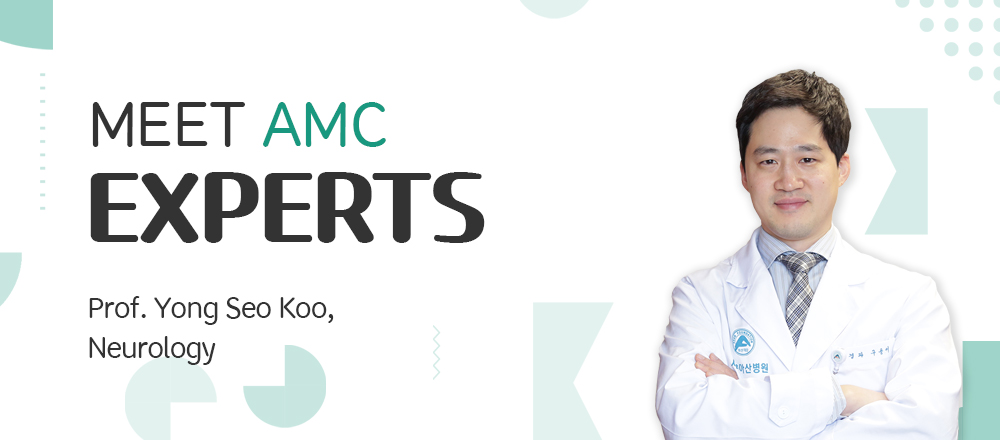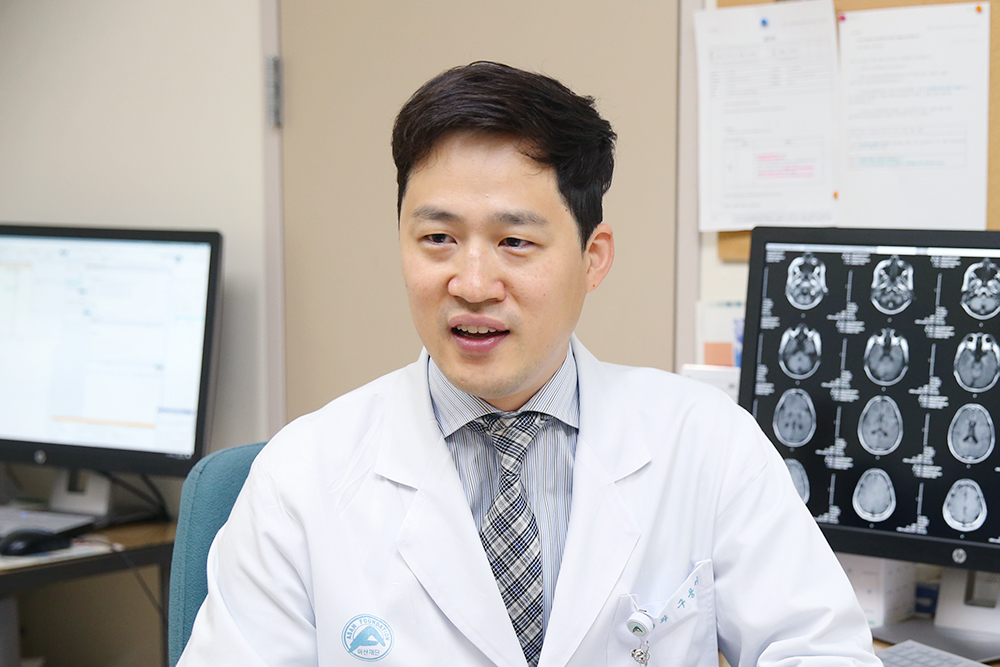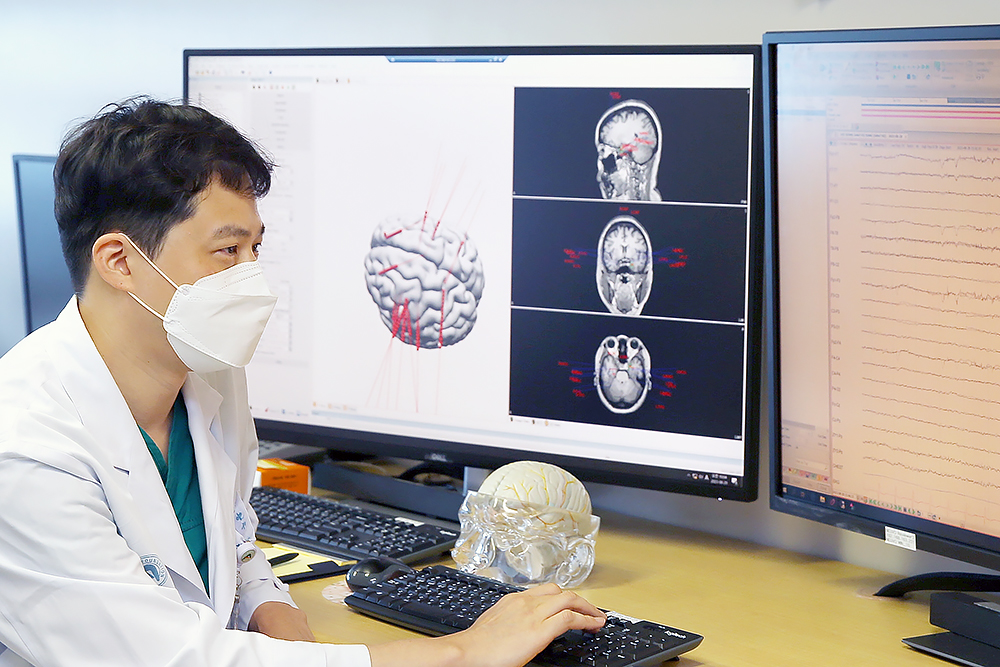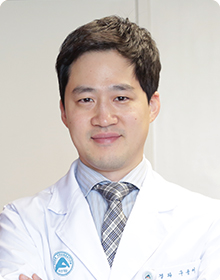-
- Global AMC MENU
- NEWS
- HEALTH
- PEOPLE
- Introduction
Professor Yong Seo Koo, Department of Neurology
"Efforts in finding the treatment for epilepsy patients as if solving a math problem"

The Department of Neurology at Asan Medical Center has been ranked No. 1 in Korea and among the top 10 in the world for four consecutive years by Newsweek, a US newsweekly magazine. As a result of this global recognition, the Department of Neurology at Asan Medical Center has treated more than 3,200 international patients from more than 60 countries over the past decade. Professor Yong Seo Koo, who meticulously analyzes various regions of the brain to determine the most suitable treatment methods for patients, shares his story about international patient treatment.
What are your guiding principles when treating patients, and what led you to choose your medical specialty
I approach patient care with a practice philosophy centered on finding the path to healing at the intersection of medical complexity and precision. Ever since I was a student, I have been interested in subjects like mathematics, which are clear-cut and have definitive answers. Unlike math, medicine is complex and ambiguous, but as I delved into the field of neurology, my perspective changed. Neurology is the study of the brain, which controls the entire human body. The brain functions with order and principles, each part responsible for specific functions. Diagnosing the brain was like solving math problems with definite solutions.
Among the various fields in neurology, I developed a particular interest in epilepsy. Epilepsy involves sudden and unpredictable increases in electrical activity in the brain, affecting various brain regions. Identifying and understanding epileptic seizures require keen observation, specialized knowledge, and cutting-edge technology. Consequently, I utilize video EEG (electroencephalography) tests to identify and pinpoint structural issues in the brain that may trigger seizures. I was intrigued by the process of discovering the most suitable treatment for epilepsy patients and made a commitment to become an expert in epilepsy care.
Tell us about your medical experience so far
I have continuously strived to learn and improve in order to provide the best possible treatment for epilepsy patients. As a result of my efforts, in 2014, I was honored with the ‘Wayne Hening Young Investigator Award’ from the International Restless Legs Syndrome Study Group, which is presented to young researchers in the field of sleep medicine. In 2015, I pursued further knowledge by undergoing training in intraoperative neurophysiological monitoring at Stanford University Medical Center in the United States, where I had the opportunity to learn from world-class institutions.
From 2017 to the present, I have conducted over 1,300 video EEG tests and collaborated with Professor Seok-Ho Hong in the Department of Neurosurgery to perform 106 pre-surgical evaluations and 51 epilepsy surgeries. Over the course of four years starting in 2017, I also worked on a national project focused on status epilepticus, and this year, I am conducting research on ‘Technology Development for Clinical Field Solutions of Nervous System Disorders.’ Throughout these diverse research endeavors, I have published more than 50 SCI and SCIE-level papers.
 ▲ Professor Yong Seo Koo is consulting an epilepsy patient.
▲ Professor Yong Seo Koo is consulting an epilepsy patient.
What are the points you consider when treating international patients?
Effective communication is of utmost importance in providing high-quality medical services to patients. To bridge the language gap with international patients and ensure accurate interpretation, Asan Medical Center has coordinators for various languages at the International Healthcare Center. These coordinators play a crucial role in minimizing information loss or misinterpretation during the translation process by accurately conveying treatment details to patients.
In order to aid patient comprehension, I also utilize visual aids. Presenting EEG results and neuroimaging scans to patients helps them gain a better understanding of their condition and the treatment process. Additionally, I highly value shared decision-making between the doctor and patient, particularly when it comes to treatment directions. For international patients, cultural differences and personal beliefs can influence the direction of treatment. I provide professional opinions on possible treatment options and the respective pros and cons, while emphasizing that the final decision rests with the patient, respecting their autonomy and choices.
Do you have any memorable international patients?
Earlier this year, I treated a patient from the United Arab Emirates who was suffering from drug-resistant epilepsy. Despite receiving treatment at some of the world's leading medical institutions, the patient's epileptic seizures remained uncontrolled, leading the patient to seek care at Asan Medical Center. In order to comprehensively assess the patient's overall condition, we considered a test such as stereoelctroencephalography (SEEG), an advanced diagnostic technique.
Before proceeding with SEEG, we wanted to record an epileptic seizure using video EEG monitoring to gain insights into the patient's condition. Unexpectedly, during hospitalization, the patient did not experience any seizures but instead reported persistent headaches and feelings of depression. Recognizing the importance of the patient's mental well-being as a key component of successful treatment, we focused on addressing their symptoms of depression as a priority.
We emphasized the significance of treating depression to the patient and provided the necessary information for treatment. This was a memorable case because it was not just a case of treating epilepsy alone, but a case of understanding the patient's situation comprehensively and providing personalized treatment to the patient.
 ▲ Professor Yong Seo Koo is analyzing video-electroencephalography(EEG)of an epilepsy patient.
▲ Professor Yong Seo Koo is analyzing video-electroencephalography(EEG)of an epilepsy patient.
Any words you would like to say to international patients?
While treating international patients, I have come to realize that regardless of their nationality or cultural background, all patients seek prompt and accurate diagnoses and effective treatments. Asan Medical Center, with its exceptional medical professionals, collaborative multidisciplinary environment, and systematic systems, is committed to providing patients with optimal care. I hope that patients can place their trust in the global competitiveness and outstanding healthcare system of Asan Medical Center and receive the best possible treatment.
※ 'Meet AMC Experts' features dedicated doctors at Asan Medical Center(AMC) who shed light on international patients coming a long way from home for treatment.

Neurology
Yong Seo Koo
Specialty : Epilepsy, Epilepsy Surgery, Seizure Disorder, Encephalitis, Intraoperative Neurophysiological Monitoring / Epilepsy Clinic
Position : Professor for CPI, Neurology
Academic Activities : American Epilepsy Society Member / Scientific Committee, Korean Epilepsy Society / Published over 50 SCI and SCIE-level papers












